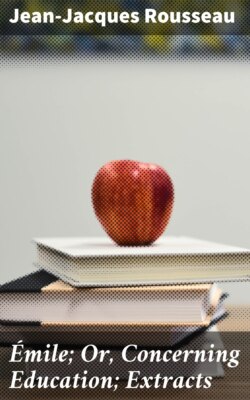Émile; Or, Concerning Education; Extracts

Реклама. ООО «ЛитРес», ИНН: 7719571260.
Оглавление
Jean-Jacques Rousseau. Émile; Or, Concerning Education; Extracts
Émile; Or, Concerning Education; Extracts
Table of Contents
INTRODUCTION
BOOK FIRST
GENERAL REMARKS
The Object of Education
The New-born Child
The Earliest Education
Maxims to Keep us True to Nature
Language
BOOK SECOND
Avoid taking too many Precautions
Childhood is to be Loved
Neither Slaves nor Tyrants
Reasoning should not begin too soon
Well-Regulated Liberty
Proceed Slowly
The Idea of Property
Falsehood. The Force of Example
Negative or Temporizing Education
Concerning the Memory
On the Study of Words
Physical Training
Clothing
Sleep
Exercise of the Senses
The Sense of Touch
The Sense of Sight
Drawing
Geometry
Hearing
The Voice
The Sense of Taste
Result. The Pupil at the Age of Ten or Twelve
BOOK THIRD
The Age of Study
The Incentive of Curiosity
Things Rather than their Signs
Imparting a Taste for Science
The Juggler
Experimental Physics
Nothing to be Taken upon Authority. Learning from the Pupil's own Necessities
Finding out the East. The Forest of Montmorency
Robinson Crusoe
Judging from Appearances. The Broken Stick
Result. The Pupil at the Age of Fifteen
Отрывок из книги
Jean-Jacques Rousseau
Published by Good Press, 2021
.....
Do you then wish him to preserve his original form? Preserve it from the moment he enters the world. As soon as he is born take possession of him, and do not leave him until he is a man. Without this you will never succeed. As the mother is the true nurse, the father is the true teacher. Let them be of one mind as to the order in which their functions are fulfilled, as well as in regard to their plan; let the child pass from the hands of the one into the hands of the other. He will be better educated by a father who is judicious, even though of moderate attainments, than by the most skilful master in the world. For zeal will supplement talent better than talent can supply what only zeal can give.
A father, when he brings his children into existence and supports them, has, in so doing, fulfilled only a third part of his task. To the human race he owes men; to society, men fitted for society; to the State, citizens. Every man who can pay this triple debt, and does not pay it is a guilty man; and if he pays it by halves, he is perhaps more guilty still. He who cannot fulfil the duties of a father has no right to be a father. Not poverty, nor severe labor, nor human respect can release him from the duty of supporting his children and of educating them himself. Readers, you may believe my words. I prophesy to any one who has natural feeling and neglects these sacred duties,—that he will long shed bitter tears over this fault, and that for those tears he will find no consolation.[4]
.....